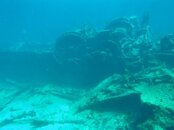I think you nailed it on the head. 1) Absolutely, no way around it, I knew better and partied anyway; 2) This statement summed up for me what I have really been asking myself. Feels exactly right, and makes this whole painful post completely worth writing it in the first place; 3) I really appreciate you noting that I am not a TOTAL idiot

! The things I remembered as it spun out of control were:
1) never, ever panic;
2) keep your reg IN;
3) don't fight the current, stop and rest;
4) slow your breathing (this was the bad part, I couldn't);
5) stay very still when a rescuer approaches. Grabbing them puts everyone in danger. I clasped my hands over my stomach and kept them there;
Reading point 4, this makes total sense to me. The same with point 4(2)., as others have noted, a DM must stay with the boat. It had not occurred to me, but clearly that was the right thing to do on his part. Point 5., the depth of the water after crossing over the reef was about 15 feet. Not sure where everyone else was, but I am so glad everyone else was safe and sound.
It's your points 6 and 7 that I think stress me the most. I just needed AIR. I flopped on the floor of the boat, my feet already blue. Someone stuck the mask on, then backed away. The air was going up my cheek. I adjusted it until I felt the air flow into my nose, then someone took that one off and put another one on. They just kind of set it on my face and backed away again. Again, I fumbled with it until that sweet, delicious O2 was flowing into my nose. I was essentially having a severe asthma attack, even though I have never, ever had asthma, or any other illness. It is called EIB.
Tony Chaney, you just made me feel SO MUCH BETTER. You read my post, got it, and went right to the heart of what actually happened. Having worked with thoracic and heart transplant patients, and trauma patients for years, the RT's were often the real life savers. No one could have predicted what happened. Your analysis made this entire event crystal clear.
I will be happy to post the video, it lasts 11 minutes. My husband has to convert it somehow though. My camera is a newer Olympus and for some reason has to be fiddled with to get it to upload. Please accept my bone-crushing, heartfelt, virtual hug!!!
---------- Post added February 23rd, 2014 at 04:26 PM ----------
View attachment 178335 This a pic of the swim through, it's a big pipe from the ship wreck. Totally cool. I am guessing I was winded by now.




